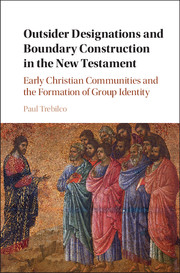
-
Select format
-
- Publisher:
- Cambridge University Press
- Publication date:
- October 2017
- October 2017
- ISBN:
- 9781108291460
- 9781108418799
- 9781108408141
- Dimensions:
- (228 x 152 mm)
- Weight & Pages:
- 0.68kg, 366 Pages
- Dimensions:
- (229 x 152 mm)
- Weight & Pages:
- 0.558kg, 372 Pages
You may already have access via personal or institutional login
Book description
What terms did early Christians use for outsiders? How did they refer to non-members? In this book-length investigation of these questions, Paul Trebilco explores the outsider designations that the early Christians used in the New Testament. He examines a range of terms, including unbelievers, 'outsiders', sinners, Gentiles, Jews, among others. Drawing on insights from social identity theory, sociolinguistics, and the sociology of deviance, he investigates the usage and development of these terms across the New Testament, and also examines how these outsider designations function in boundary construction across several texts. Trebilco's analysis leads to new conclusions about the identity and character of the early Christian movement, the range of relations between early Christians and outsiders, and the theology of particular New Testament authors.
Reviews
'Scholars, pastors, and students interested in the social context and identity formation of the early church will certainly benefit from Trebilco’s labors.'
David M. Shaw Source: Journal of the Evangelical Theological Society
Contents
Metrics
Full text views
Full text views help Loading metrics...
Loading metrics...
* Views captured on Cambridge Core between #date#. This data will be updated every 24 hours.
Usage data cannot currently be displayed.
Accessibility standard: Unknown
Why this information is here
This section outlines the accessibility features of this content - including support for screen readers, full keyboard navigation and high-contrast display options. This may not be relevant for you.
Accessibility Information
Accessibility compliance for the PDF of this book is currently unknown and may be updated in the future.


